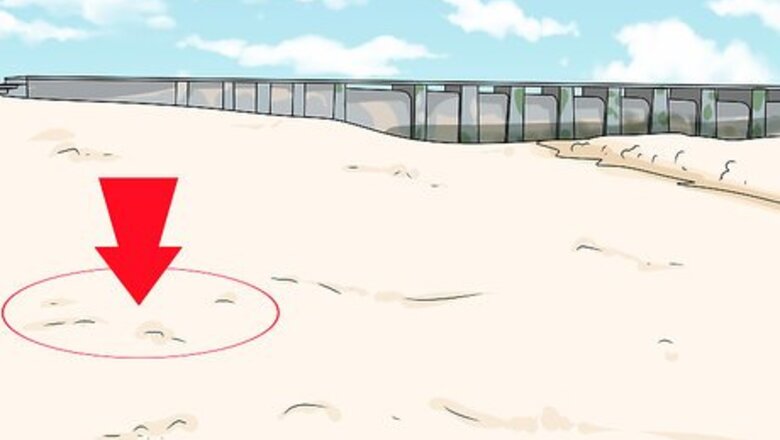
views
Making Strong Sand Castles
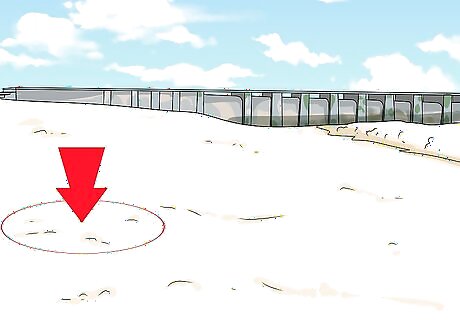
Choose a spot that won't get washed away. You could happily spend an afternoon building a city on the beach. If the tide is on its way in, sit down near the tide line, the wet sand farthest from the water.
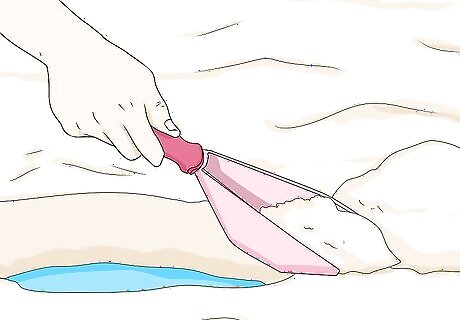
Dig a well for easy water access (optional). Sand castles have just two ingredients: sand and water. For easy access to the second, dig a hole within arm's reach of where you want to build. Dig straight down until water pools at the bottom of the hole. You can skip this step if the sand is wet enough to mold on its own.
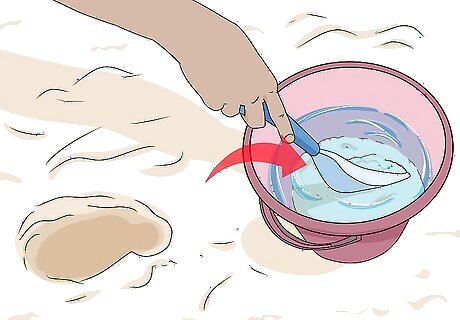
Scoop up clean sand. Drop a handful of sand in a bucket of clear water. If the liquid looks murky or dirty, the sand has too much clay. It's much easier to build with fine, clean sand that leaves the water clear. The best sand for building is so fine it feels like a powder, and has grains with many rough edges. Most beach sand is too smooth to build truly giant sculptures, so don't feel bad if you miss out on the world record.

Mix in a little water. Surprisingly, the strongest mix you can make is only 1% water and 99% sand. This is just enough water to cling to the grains of sand, forming "bridges" between the grains of sand to lock them together. But you don't have to get out the eyedropper — for a day at the beach, just mix until you can roll a ball of sand in your hand without it crumbling.
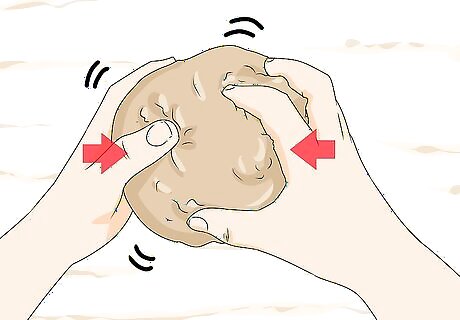
Squeeze the sand as hard as you can. The more you compress the sand, the stronger it is. The best tools for the job are your bare hands. Trying to tamp the sand down with a shovel creates more cracks or loose spots where your castle could fall apart. Professional sand sculptors compact their sand in wooden frames, with no top or bottom. A bucket doesn't work for this because the sand gets stuck to the base. Listen for a "plop" or sucking sound when you empty tightly packed sand from a bucket — that's the sound of your hard work falling apart again.
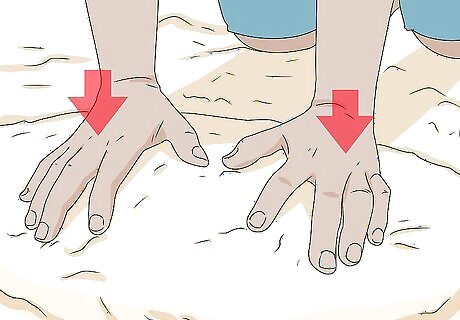
Start with a strong base. A sturdy, wide platform is a big help when you're trying to build a tall castle. Make a flat surface of wet sand larger than you think you need. Compress it by pushing it with your hands or stepping on it with bare feet. The perfect sculpture can get as tall as 2.5 meters (8.2 feet) on a base just 20 centimeters (8 inches) across.
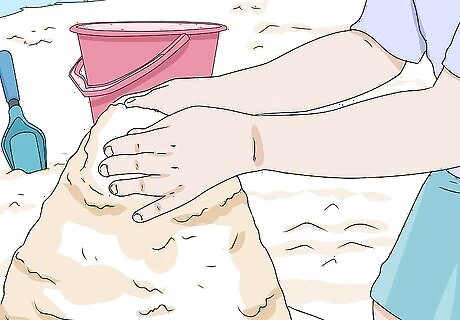
Build up a tall heap of wet sand. Don't try to make the base of your castle perfect from the beginning. Get the general shape you want first, even if it's just a big pile. Do this by stacking big handfuls of wet sand. Place them as gently as you can, without slapping or squeezing. Stop when the pile starts slumping or tipping over — you can always add more later. This can be much wetter than the sand you used for the base, as long as it mostly sticks together. If building a tower, lower your hand from above onto the heap. If building walls, place each handful from the side, smoothing out the wall slightly.
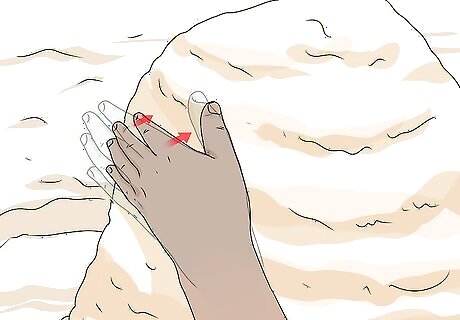
Jiggle the heap of sand to drain out water. Place your hands gently on either side of the top of your heap. Very gently wiggle your hands back and forth to vibrate the sand. This will send the extra water dribbling down through the sand below. The sand left behind will settle into a dense, firm shape. Stop jiggling if you see any cracks appear.
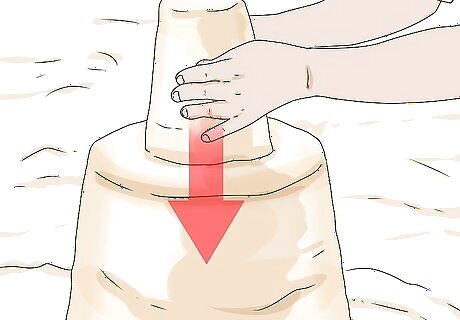
Shape your castle from the top down. Mold the top of your castle into the shapes of towers, buttresses, or anything you like. As you move down, jiggle the sand again wherever it feels loose or extra wet. Check out the ideas below for forming specific castle shapes.
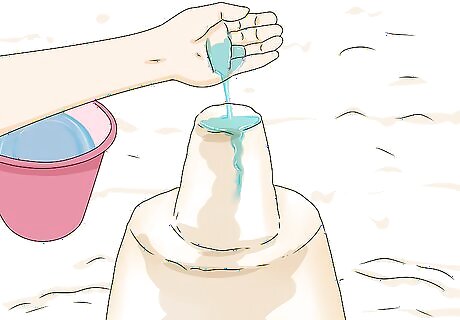
Keep your sand moist. If you see the sand drying out and crumbling, pour on a handful of water and pat it together again. It's safer to add too much water than too little, since the extra water will drain out over time. Bring along a spray bottle so you can quickly wet the castle surface as you sculpt.
Making Specific Shapes
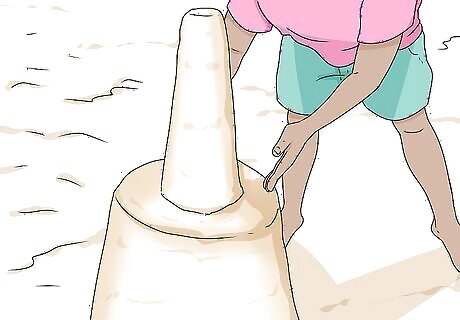
Build taller towers. The fastest way to build tall towers is with a stack of wet "sand pancakes." Mix together a large double handful of sand with almost as much water. Plop it down on the beach in a circle at least 20 cm (8 in) wide. Flatten the top a little. Working as quickly as possible, stack three or four more "pancakes," each one slightly smaller than the one below it. Once you get this high, stack even smaller handfuls gently on top, without trying to flatten them. Smooth out the walls of the tower before they dry. Jiggle the sand between cupped hands as you go to help the sand settle.
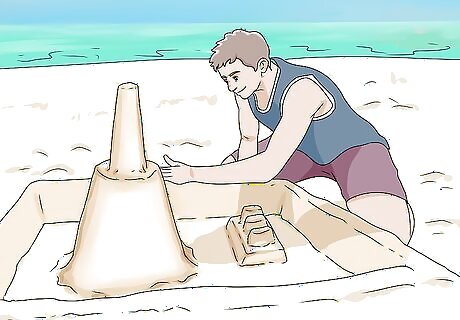
Shape the castle walls. You can build these in almost the same way as towers. Just form roughly square "bricks" of wet sand. Set them on top of each other gently, shaping and jiggling the sides to settle them into a flat shape. Your walls will be more sturdy if you start building them against a finished tower.
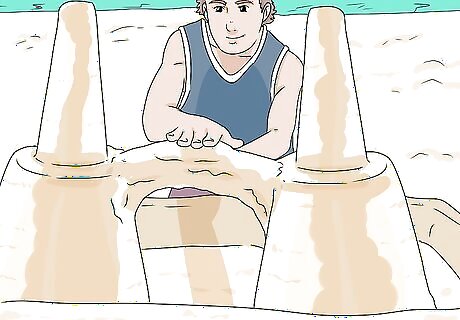
Make an arch. The easiest way to build an arch is to build two towers quite close together, leaning slightly inward as they go higher. As soon as the towers are close enough together, make a bridge between the tower tops with your hand. Pile more wet sand over your hand to connect the two towers, and wait a few seconds for it to dry. Heavy arches are more likely to collapse, so scrape off as much sand as you can from the sides and top before you move your hand away. Professional sand sculptors can connect towers quite far apart, just inserting a bridge of sand between them and smoothing it out. This is pretty difficult, but if you're up for a challenge, use the same approach recommended earlier for the base of your castle: slightly wet sand, very densely packed.
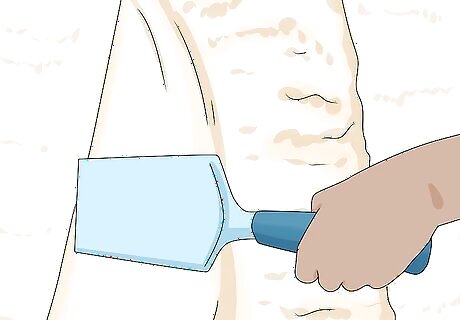
Use small tools to shape the castle surfaces. A small rake, shovel, pencil, or any other handheld tool can carve into the sand. To make a flat surface, just drag the tool slowly and steadily across the sand. You can pack sand into funnels, small buckets, or other containers to shape it quickly into different forms. If you can, use containers that have a hole in the base. A solid base tends to stick to the sand, making it hard to force out. If the sand crumbles when you try to carve it, add more water. If it slumps, let it dry out a little.
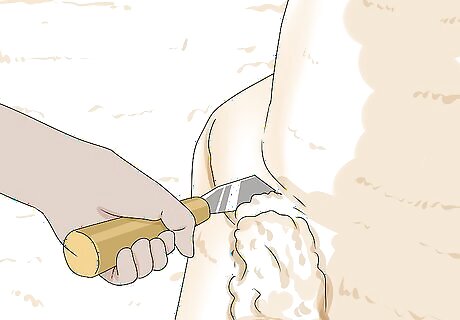
Carve the castle from the top downward. It's always easiest to carve the top of your castle first. If you move from the bottom upward, the falling sand from above will rub out your careful designs.
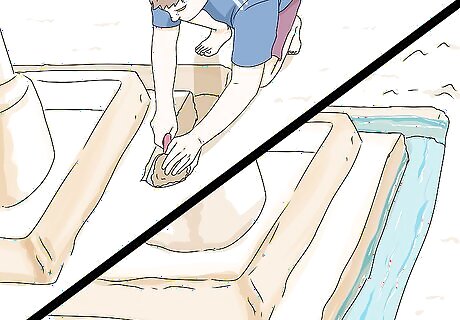
Plan your moat carefully. If you decide to add a moat, carve the water channels a little distance away from your castle base. Water can seep into the nearby sand and cause your whole castle to slump into the foundation. Make sure there's plenty of space between the moat and castle to avoid this problem. If water flows down to the moat from higher ground than the castle, make sure it's not directly above your sculpture. Keep it to one side, so the water flowing through the sand doesn't collide with your hard work.




















Comments
0 comment